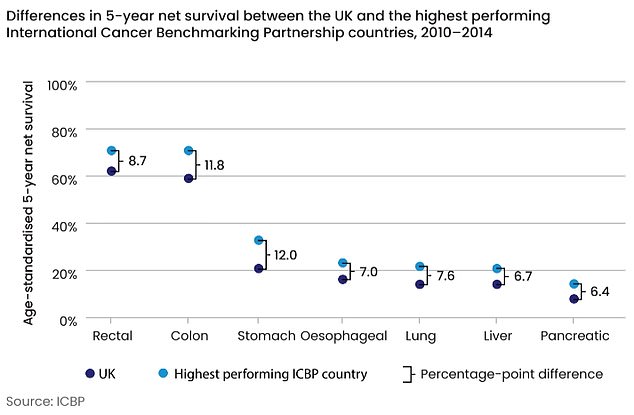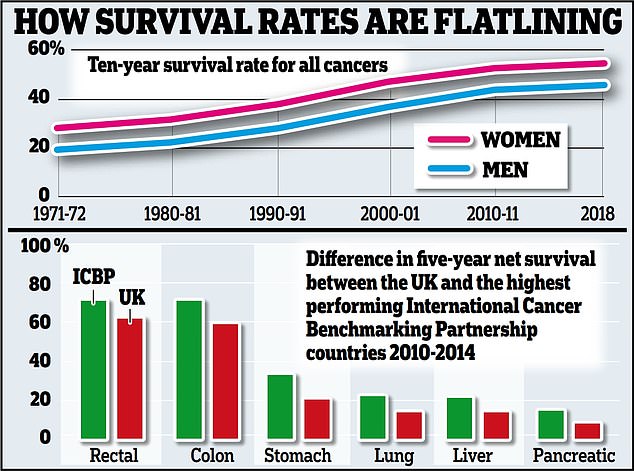Improvements in cancer survival are the slowest in half a century and deaths are expected to soar by 50 percent in the next 25 years.
World health leaders warn of a cancer ticking time bomb, while a Cancer Research UK report revealed progress in fighting the disease has stalled at levels last seen in the 1970s.
A growing and aging population, coupled with rising levels of obesity, will see around 280,000 people die from cancer each year in the UK by 2050, the World Health Organization predicts.
And despite being in “a golden age of cancer research”, delays in diagnosis and treatment mean “too many people are losing their lives”.
Slow progress has also seen the UK fall behind comparable countries including Australia, Canada, Denmark and Norway.
ABOVE: The proportion of patients expected to survive ten years or more jumped from 24 per cent in 1971/72 to 48 per cent in 2010/11. But since then, the rate of improvement has only increased two percentage points to 50 percent. BELOW: Red bars show the five-year cancer survival rate in the UK, while green bars show the equivalent figure for the International Cancer Benchmarking Association’s top performing country (Australia, Canada, Denmark , Ireland, New Zealand or Norway). It shows that cancer survival rates in the UK are up to 12 percentage points lower than in comparable countries.
But while the outlook looks bleak, experts say it is “fixable” if ministers commit to a ten-year strategy for prevention, diagnosis and treatment.
Written by experts at the London School of Hygiene and Tropical Medicine, the report shows that ten-year survival for all cancers combined has doubled since the early 1970s.
The proportion of patients expected to survive ten years or more jumped from 24 per cent in 1971/72 to 48 per cent in 2010/11.
But since then, the rate of improvement has only increased two percentage points to 50 percent.
While annual increases in survival averaged 2.7 percent at the start of the millennium, they typically rose just 0.6 percent in the decade to 2018, the latest figures available.
It means that survival increased three to five times faster in the decades before 2010, the researchers note.
The UK’s poor outcomes compared to other countries are probably due to the speed at which people are diagnosed and their access to the best treatments.
The report said: ‘Research also suggests that policy differences between countries may also explain some of this international variation.
“Countries with consistent cancer policies have seen the greatest improvements in cancer survival between 1995 and 2014.”
Lifestyle factors are also important: around four in 10 cases of cancer in the UK are preventable.
While cases caused by smoking continue to decrease, those caused by obesity are going in the opposite direction: cancers caused by alcohol consumption, poor diet and lack of exercise are increasing.
Overweight and obesity cause around 22,800 cases and 9,200 deaths from cancer each year in the UK, and the numbers are expected to rise as the country’s waistline grows.
Lung, bowel, melanoma, skin and breast cancers account for almost two-thirds (63 per cent) of all preventable cancer cases, and public health campaigns are needed to reduce these numbers.
While research has driven many of the improvements made so far in survival, Cancer Research UK has estimated that by the end of the next decade there will be a funding gap of more than £1 billion for research into the disease.

The dark blue dots show the five-year cancer survival rate in the UK, while the dark blue dots show the equivalent figure for the International Cancer Benchmarking Association’s top performing country (Australia). , Canada, Denmark, Ireland, New Zealand or Norway). It shows that cancer survival rates in the UK are up to 12 per cent lower than in comparable countries.
Meanwhile, repeatedly missed treatment goals and a shortage of radiologists are also taking their toll.
About 71.9 percent of patients urgently referred for suspected cancer in November 2023 were diagnosed or had cancer ruled out within 28 days, below the target of 75 percent.
The proportion of patients who waited more than 62 days in November from an urgent referral for suspected cancer to their first definitive cancer treatment was 65.2 per cent. This is well below the 85 percent target.
The report comes after the International Agency for Research on Cancer (IARC) and the World Health Organization (WHO) said on Thursday that cancer cases in the UK will rise 37 per cent to 624,582 by 2050.
In 2022, there were 181,807 deaths in the UK due to cancer, they said, and this figure is expected to rise to 279,004 in 2050, an increase of 53 per cent.
Jon Shelton, head of cancer intelligence at Cancer Research UK, said cancer death rates are falling but there are many areas that can be improved.
He added: “People are waiting too long to receive a diagnosis and start treatment, and waiting time targets for cancer are consistently missed.” And we need to prevent more cancers.”
An NHS spokesperson said it is diagnosing and treating more people with cancer than ever at an early stage, when the disease is easier to treat and survival rates are higher than ever.
He added: “But there is more to do, and the NHS continues to test and adopt the latest advances in treatments, along with national awareness campaigns, screening programs and new initiatives to increase early diagnosis, including lung and liver screening. closer to people in the community and launch the latest genetic tests to early identify people at risk of cancer.
“The NHS will not relent in its efforts to ensure people are seen and diagnosed as soon as possible, and it is vital that people continue to speak up if they are worried about symptoms – getting checked saves lives.”
The report praised the government’s new proposals to reduce smoking and said “it is essential that they are implemented as they could help prevent around 18,200 cases of cancer by 2040 and ultimately help end cancers caused by due to smoking.”
A DHSC spokesperson said: “We welcome the news that record numbers of people are surviving long-term cancer, that people have been diagnosed earlier and the NHS has treated record numbers of cancer patients over the years. last two years.” But we know there is more work to do.
‘We are working to make access to oncological services faster and easier. We have also invested £2.3 billion to accelerate diagnosis and have launched 153 community diagnostic centers across England, which will help us achieve our goal of detecting 75 per cent of all cancers at stage 1 or 2 by 2028.
‘Smoking causes 1 in 4 deaths from cancer and causes 80,000 deaths a year. Our plans to prevent children turning 15 this year or younger from being legally sold tobacco will protect future generations from various forms of cancer.’


